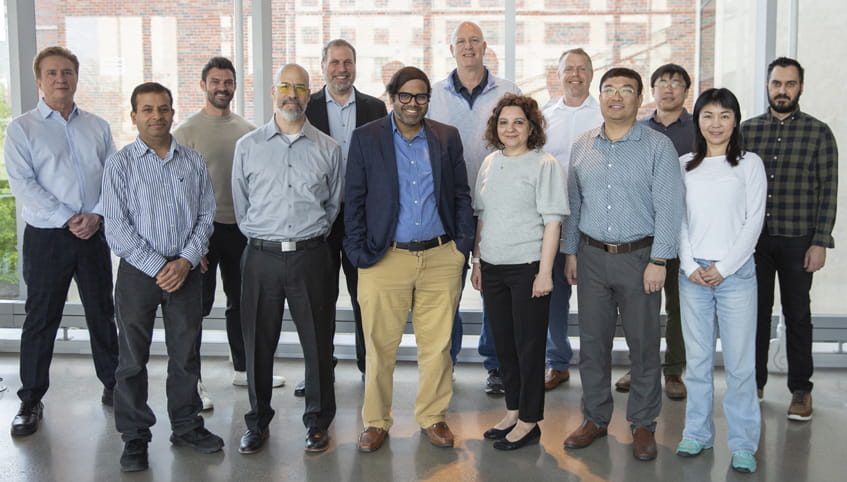- Home
- Research
- Shared Resources and Core Facilities
- Biostatistics & Informatics

In recognition of the upcoming Independence Day holiday, some of The University of Kansas Cancer Center's offices will have modified hours on Friday, July 4.
The Biostatistics and Informatics Shared Resource (BISR) plays an essential role in the research activities of The University of Kansas Cancer Center by supporting the data science needs of investigators.
The BISR assists KU Cancer Center members by providing expertise in study design, statistical oversight and analyses, clinical research informatics and data management, electronic data collection, bioinformatics, statistical genomics and investigator-initiated clinical trials. The BISR consists of faculty and staff whose diverse expertise and skill sets span the areas of biostatistics, bioinformatics and informatics. The considerable overlap between these areas allows researchers to work with a single shared resource for all data collection, analytics and statistical analysis needs.
To support the research activities of KU Cancer Center members, the specific aims of this resource are to:
Although experimental design and statistics are obvious ways the Biostatistics and Informatics Shared Resource worked with us, I appreciated their willingness to help design optimal methods in which to depict the data, particularly big data. –Danny Welch, cancer center researcher
[00:00:00] Hi, I'm Devin Koestler. I'm a professor in the Department of Biostatistics and Data Science at the University of Kansas Medical Center, and I also co-direct the Biostatistics and Informatics Shared Resource.
“How does your shared resource support researchers?”
The Biostatistics and Informatics Shared Resource supports the data science needs of the KU Cancer Center and its investigators. Data science is a multidisciplinary field that spans statistics, bioinformatics, computer science, mathematics, machine learning, artificial intelligence, and biomedical informatics.
“Can you give an example of when your shared resource contributed to a study with major scientific impact? How did you contribute?”
So, the BISR was recently involved in a study with Dr. Kimber Richter, who is a member of the Cancer Prevention and Control Research Program. Dr. Richter was interested in investigating two different strategies, an opt in and an opt out approach for treating tobacco cessation. In that study, the BISR participated in the design of the study using an adaptive design.
The [00:01:00] BISR also participated in the analysis of the study data after the study was run. This particular study has important public health implications. It was shown that the opt out approach had double the engagement as compared to the opt in approach, and it also had increased quit rates. This is important as we know that tobacco is a major risk factor for cancer risk and prognosis.
“Why should researchers consider partnering with your shared resource on their next project?”
So members of the BISR have a really diverse skill set that spans the data sciences. Um, we have skill sets in clinical trial design, bioinformatics, informatics, and data management expertise. And we're collaborators with KUCC investigators and the skill set that we offer and the tools and resources we have at our disposal can elevate the quality and science being conducted by KUCC [00:02:00] researchers.




Engage the Biostatistics and Informatics Shared Resource on your project. Submit your service request.
Pricing inquiries should be directed to Megan Tremblay, project director. All other questions concerning the BISR can be directed to Drs. Gajewski, Koestler and Mudaranthakam.
The BISR may decline requests that arrive too close to the deadline. Please also consider that more complex designs or analyses will require more time.

The BISR is plugged into the Community Outreach component of KU Cancer Center’s NCI designation. For example, the BISR has helped build the cancer center’s Data Commonwealth, which enhances data acquisition, data engineering, data science and software development to facilitate research in our unique catchment area of Kansas and western Missouri.
One of the BISR’s ongoing initiatives in the area of Community Outreach involves the development of a database for Organizing and Prioritizing Trends to Inform KU Cancer Center researchers (OPTIK). This database consolidates demographic, cancer risk factor, and incidence rate data into a single system that allows cancer center members to visualize the data across the cancer center’s catchment area. The goal is that OPTIK will assist in prioritizing KU Cancer Center research activities that meet the needs of the catchment area. Additionally, BISR develops novel clinical trial design and simulation works. Two examples include a telephone-based smoking cessation program culturally tailored to American Indians and an adaptive intervention to maximize colorectal screening in safety net populations.
This resource is funded by The University of Kansas Cancer Center Support Grant (CCSG) awarded by the National Cancer Institute (P30 CA168524). Publications that have utilized facility resources, services or scientific data generated by the resource should acknowledge the resource and cite the NCI CCSG grant.
To apply, click here. Applications are accepted throughout the year. Contact Lisa Harlan-Williams at lharlan-williams@kumc.edu for more information regarding membership.